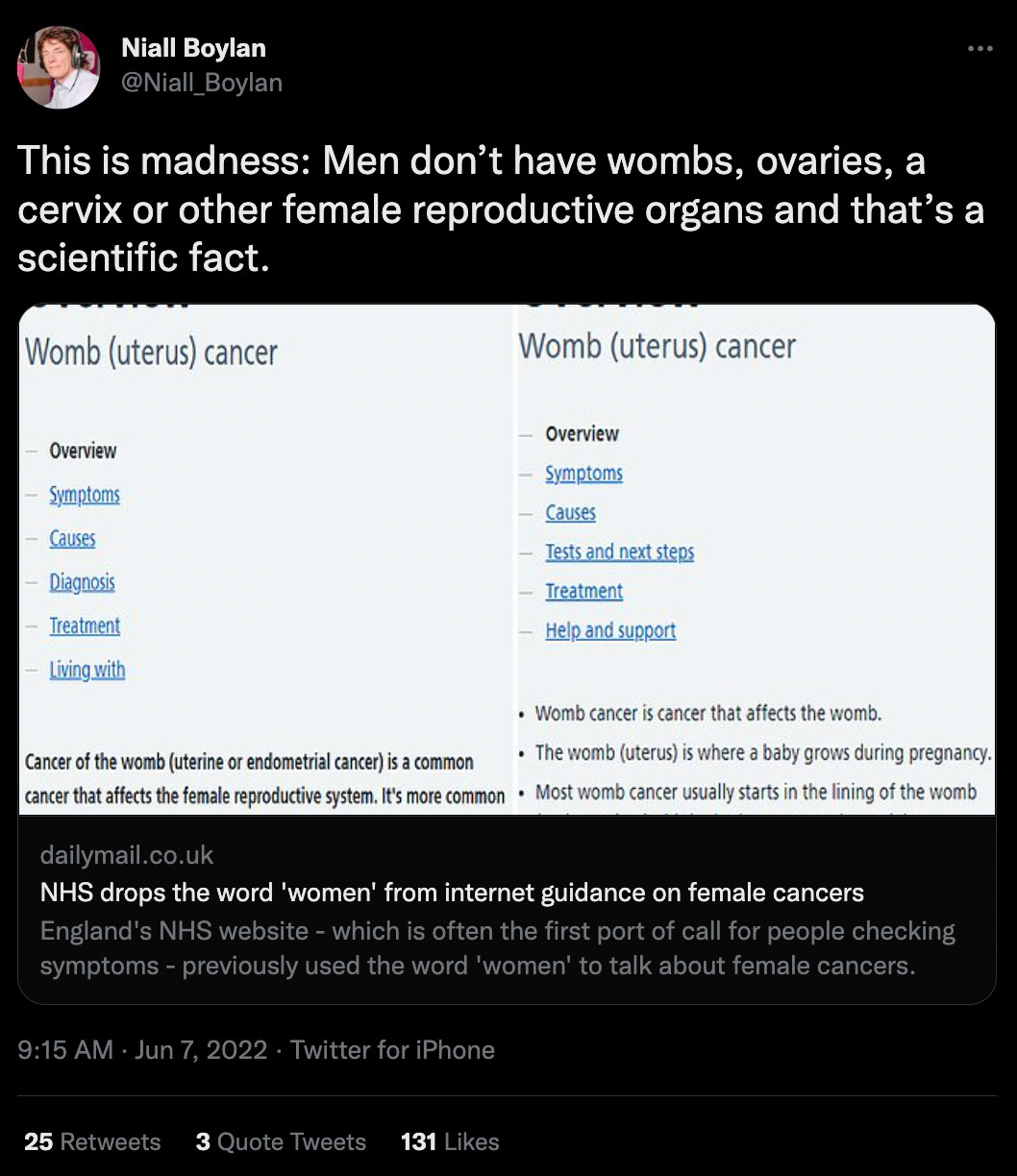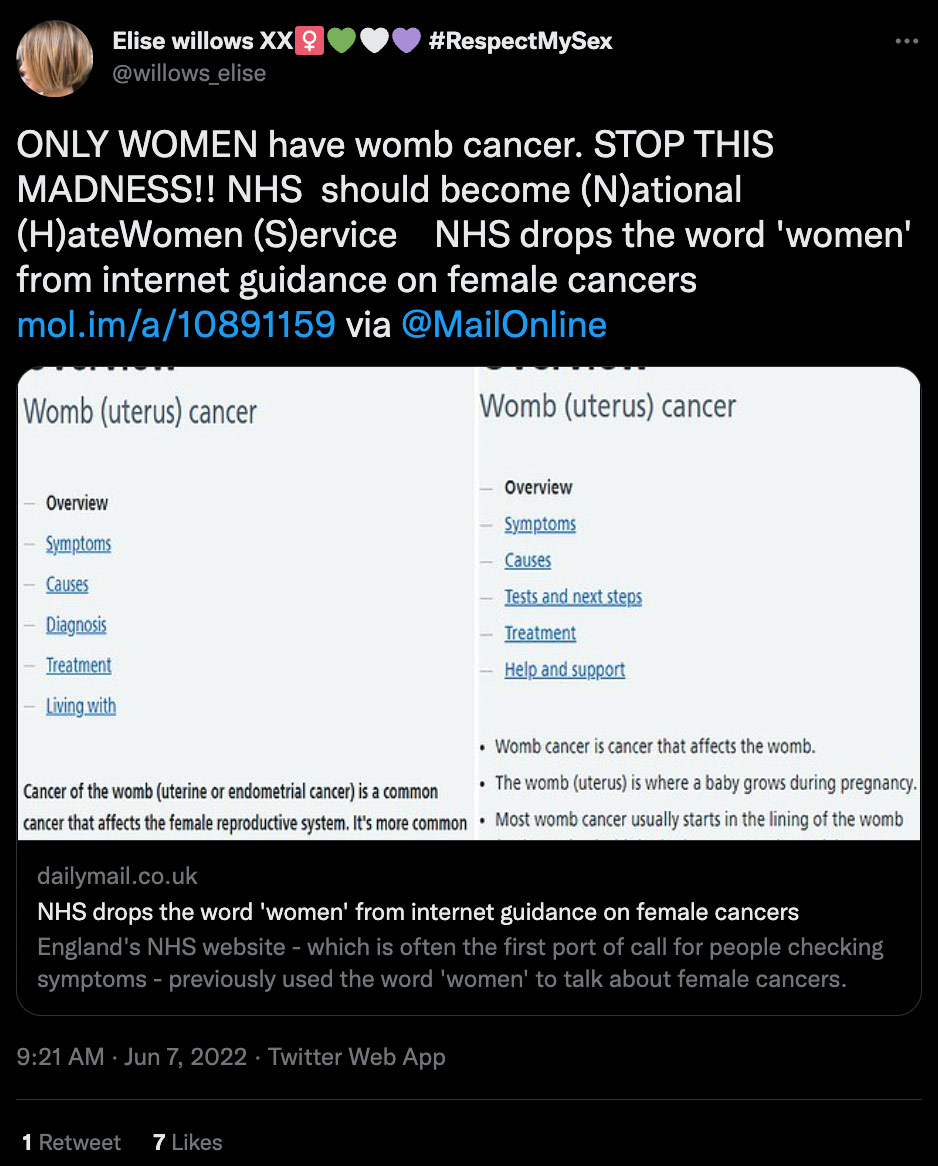NHS receives heavy backlash for dropping the word ‘women’ from online cancer guidance

The National Health Service (NHS) has allegedly removed the words pertaining to the gendered term ‘women’ from a number of its web pages, as first reported by The Times. Some of the online medical guidance affected by this change includes those on ovarian, womb and cervical cancers—conditions that are typically suffered by those born with the female sex biology.
The NHS’ goal behind the move was to ‘desex’ its jargon to become more gender-neutral and inclusive of those with female biological anatomy who do not identity as women, like non-binary or transgender individuals.
The Daily Mail made note of some of these changes. According to the publication’s testimony, one informational page on the NHS site used to read: “Cancer of the womb (uterine or endometrial cancer) is a common cancer that affects the female reproductive system. It’s more common in women who have been through the menopause.” Instead, it now reads: “Most womb cancer usually starts in the lining of the womb (endometrium), this is also known as endometrial cancer.”
Another example cited by The Times stated that ovarian cancer is “one of the most common types of cancer in women.” Now it explains: “Anyone with ovaries can get ovarian cancer, but it mostly affects those over 50.” However, the words have not been entirely removed, with the word ‘women’ or ‘woman’ still being referenced in sub-sections of the pages, the outlet noted.
A spokesperson for NHS Digital—the body responsible for the updating of online NHS guidance—told the publication that allegations the words had been entirely removed were unfounded: “It is not correct to say that there is no mention of women on the ovarian, womb and cervical cancer pages. We have updated the pages as part of our routine review of web pages to keep them in line with the best clinical evidence, and make them as helpful as possible to everyone who needs them.”
Despite this, reactions to the changes have led to criticism from experts as well as people online. A nurse who represents the campaign group Sex Not Gender Nurses and Midwives, Kat Barber, spoke to The Times and suggested that desexing language could actually create another issue when it comes to language barriers. Though Barber welcomed the efforts to be more inclusionary, she also noted that the NHS cannot operate under the assumption that medical names for female anatomy are widely known—especially when evidence suggests that is indeed the case.
“Whilst we welcome efforts to include, inclusion should consider all communities and should never trump safety,” she continued.
Another expert, Doctor Karleen Gribble of Western Sydney University (and lead author on a paper about why sexed language in birth and childcare is vital) shared the same sentiments, telling The Times: “I think that the changes to desex language are well intentioned, but we are seeing that they are making communications less clear and when it comes to critical health issues that has great potential to place the health and wellbeing of individuals at risk.”
While the subject is nuanced and requires mutual understanding, the above reports have subsequently resulted in an online backlash that has permeated through Twitter—a backlash not similar to those of the experts but one motivated largely by what may be seen as an ‘anti-woke’ brigade. “This is madness: Men don’t have wombs, ovaries, a cervix or other female reproductive organs and that’s a scientific fact,” broadcaster Niall Boylan wrote.

Another said: “ONLY WOMEN have womb cancer. STOP THIS MADNESS!! NHS should become (N)ational (H)ateWomen (S)ervice,” while a third read, “The NHS should do the job properly and not concern themselves with minority causes.” A fourth user doubled down on their attack on the health service, “This nonsense is why the NHS is not fit for purpose, they are too busy being WOKE than treating the sick. These cancers ONLY affect biological women,” capitalising “biological women” in the tweet.

While there are, of course, valid concerns on such a change and a healthy discussion is warranted, such introductions often become an opportunity for many to unabashedly display their outdated understandings of gender and offer an excuse to be transphobic. And no one has time for that.




